Something weird has been happening when it comes to the online discourse about negative reviews. As best I can tell it was kicked off by comments made by Seth Rogen on a podcast, where he talked about the emotional toll of receiving negative reviews.
“It’s devastating,” Rogen said, and I can relate. I remember reading the Kirkus Reviews review of my novel, The Funny Man, and experiencing a tingling in my extremities as the depth of scorn landed. It’s been a dozen years, and encountering the text again for the purposes of this newsletter brought back an echo of that sensation. Not pleasant.
I wasn’t going to share the review here, but it’s short, and what’s the point about writing about negative reviews if you can’t be forthright about your own?
The idea that someone would call a book I saw as embarrassingly sincere as “smug” was, well…devastating. I could and would argue that this reviewer missed the book entirely, its framing and structure as a satire. The notion that either the funny man or I had a fondness for Kick in the A$$ is either a failure on my part to convey what is actual horror at the development in the novel, or a failure of the reviewer to connect with the story.
While I believe there are parts of the review that I think are simply wrong, bad, ungenerous readings of the text, the reality of reviews, particularly negative reviews, is that they have the same right to existence as the creative work you put into the world. There’s literally nothing you can do about it.
The weirdness I refer to at the top is that there seems to be a movement in at least some quarters to curtail the practice of issuing negative reviews because of the emotional harm that they can deliver to the creator of the work being reviewed. I’m not going to link to the many tweets I saw expressing these or similar sentiments because I have no interest in being part of a social media pile-on experience, but I was honestly surprised to see so many people agreeing that negative reviews are, by their nature, “unfair.”
I see things differently. I think negative reviews are necessary.
I say negative reviews are necessary even though I do not write book reviews because I do not want to write a negative review that might emotionally wound the author. I do not have the necessary stuff to do that work, but respect those who do.
I was about to say that I’d never written a negative review, but that’s not quite true. I did write a rather scornful column Sean Penn’s novel, Bob Honey Who Just Do Stuff because I was offended both by its existence, and the array of literary luminaries that blurbed it positively because it was written by Sean Penn.
Penn’s people did probably the smartest thing you can do when a bunch of people heap scorn on your work by leaning into it and taking out a full-page add in the New York Times. The quote cited from the Chicago Tribune (“Ignore Penn.”) is me, and I’m grateful to Penn and his people because it’s probably the only time I’ll ever make the Times.
The degree of enjoyment one has in reading a negative review is often directly correlated to one’s own feelings about the book/author under review. Back in the day I recall being simultaneously stimulated and horrified by the writer Dale Peck’s “hatchet jobs” (which were gathered into a collection by the same title) because he was often targeting books and writers that I quite enjoyed.
At the time, I took some offense to Peck’s broadsides, finding the degree of pique he seemed to conjure about perfectly good books performative and self-aggrandizing, but in hindsight I have a much greater appreciation for what I believe to be the underlying sincerity and integrity of his views. For sure, it could be annoying, as when he refused to judge a matchup in the 2006 Tournament of Books between Ali Smith’s The Accidental and Ian McEwan’s Saturday, declaring “books like these make me want to join Al Qaeda.”
Forced to flip a coin to choose a winner, The Accidental won, ultimately going on to win the whole tournament. (Let that be a lesson in how arbitrary book awards can be.)
As a novelist himself, Peck was something of an anomaly, as I think most writers who also do reviews tend to pull their punches either out of a sense of solidarity or worries about karma or whatever.
As annoying as Peck could be, it is important to have critics who are free to write negatively, particularly those like Peck who saw himself as writing against the prevailing tastes of the day.
The critic’s role as someone willing to swim against the tide is one of the reasons I admire efforts like this one from Times book critic Dwight Garner reviewing Richard Powers’s most recent novel, Bewilderment, even though I think he’s totally wrong.
Garner takes the occasion of the review to try to ether nearly thirty-years worth of Powers’s oeuvre:
Garner’s beef seems to be with a broader category of cultural attitude which he thinks Powers’s work exemplifies, and he’s determined to get his licks in. Those who agree with Garner would call this a “corrective.”
I think it’s important for those of who don’t agree to not go too far the other way and reject the point of view entirely. I now prefer to take negative reviews of things I like as not a corrective, but perhaps a “caution,” an opportunity to check in with myself and see if I truly believe what I believe, or if perhaps I am guilty of sticking with the direction of the prevailing tide.
In this sense, the negative review could be seen as a service to all.
One of the weirder strands of commentary surrounding Rogen’s statement is that reviewers must be bad at their jobs because they are frequently out of step with “the public.” This is, I think, a fundamentally bad way to think about the role of critics and reviewers.
In the podcast interview, Rogen notes that despite the negative reviews of The Green Hornet, the movie had a significant, $35 million, opening weekend, suggesting that the movie didn’t get a fair shake given the public’s interest in it, but this is a red herring that deflects from the role of the critic/reviewer.
A.O. Scott the longtime film reviewer for the Times is ending his run, shifting to books, interestingly enough. In a kind of farewell to the movies piece Scott talks about the role of the critic and reflecting on the question of what he would do differently looking at his reviews in hindsight:
“A big part of any critic’s job is to be wrong…” I like that. I think this is one of the reasons I don’t have what it takes to be a critic. I am a gut reactor mixed with a slow thinker, and would find it very difficult to be out front with my opinions in the way that’s required of a good critic.
At the same time, let me weigh in on the side of the public in the battle against critics regarding something else Scott had to say in his final piece about “modern fandom”:
The critic’s complaint about “modern fandom” seems to me to be the inverse of fandom’s complaint about critics’ failure to reflect popular sentiments. Fans of things can and should ignore the critics if they just want to be fans. No one is obligated to join your fandom.
Similarly, critics should be strong enough to ignore the slings and arrows of fans who don’t care for their criticisms. I don’t doubt that it’s unpleasant to be hounded online by a group of fans, and I share some concerns about the effects of a fan-based culture that turns movies/books/et al into “products,” and devalues originality.
But the notion that fandom like this is akin to genuine authoritarian movements because critics face online backlash is a bit much, the 1% cloaking themselves as defenders of virtue in order to not have to deal with the hoi polloi.
If creators have to withstand negative reviews, reviewers can buck up against social media blowback.
So we must make space for negative reviews no matter how hurtful they may be, and no matter what impact they may have on the fortunes of the thing being reviewed.
I say this believing until the day I die that the Kirkus review of my novel was a potentially fatal blow to the fortunes of the book. Kirkus reviews run first, and a strongly favorable review from Kirkus can drive other industry interest. I get multiple emails daily from publicists touting “starred” trade reviews trying to tempt me to pay attention to particular books.
With the benefit of hindsight, I can chart the cooling of interest from my agent and publisher for the book to that review. The odds were overwhelmingly in favor of what ultimately happened to the book - barely reviewed, hardly read, consigned to being out-of-print - happening regardless of that review, but it sure didn’t help things.
For longer than I like to admit, I let this gnaw at me, wondering who this anonymous a-hole who called me and my book smug must be, if maybe they had a grudge because I’d rejected them in my role editing McSweeney’s or something like that.
But somewhere along the line, I had to give that up, I had to believe that this person was operating in good faith. I had to believe that their response to my book is just the kind of thing that happens, that indeed sometimes must happen if the whole enterprise of putting creative work into the world is going to continue.
I had to believe it even if it might not be true, because the alternative is to destroy one’s self.
For sure, all reviews should be transparent and fair good faith best efforts, but sometimes that’s going to result in negative reviews.
I don’t fault Seth Rogen for airing his own humanity publicly. In fact, it’s the opposite. I’m glad that he can admit that even someone as successful as him can get rattled by a bad review. It’s very human.
The cultural ecosystem needs both creative work and the critical commentary about that work. In the long run, it’s all much healthier.
It may also be healthy to pause and consider the feelings of people like me, or Seth Rogen, but those considerations have no role in the work that must be done.
Links
At the Chicago Tribune this week I wrote about the deep, immersive reading experience I recently had with Yiyun Li’s The Book of Goose.
What does your bookshelf say about you? Writing at McSweeney’s, Lizzie Logan has the answer.
The Times has a list of 19 nonfiction books to have on your radar for Spring, including two very much on my radar, The Teachers: A Year Inside America’s Most Vulnerable, Important Profession by Alexandra Robbins and Jonathan Eig’s biography of Martin Luther King, King: A Life.
Over at his highly recommended newsletter
Lincoln Michel looks at one of the potential consequences of AI-generating writing in his piece, "Library of Blather."A few weeks back at Anne Trubek’s newsletter
she looked at one of the greatest mistakes in publishing history involving Alex Haley and The Autobiography of Malcolm X.I need to issue a correction on a link from a previous newsletter in which I said that The Guest Lecture was Martin Riker’s first novel. That was wrong. Hi first novel, Samuel Johnson’s Eternal Return was published by Coffee House Press in 2018. Having now read The Guest Lecture, and finding it terrific, I’m looking forward to digging into Samuel Johnson’s Eternal Return someday soon.
Recommendations
All books linked here are part of The Biblioracle Recommends bookshop at Bookshop.org. Affiliate income for purchases through the bookshop goes to Open Books in Chicago and another book-related charity still to be named.
Affiliate income is $81.20 for the year.
1. Luster by Raven Leilani
2. The Overstory by Richard Powers
3. The Stone Diaries by Carol Shields
4. Our Souls at Night by Kent Haruf
5. Leave the World Behind by Rumaan Alan
Mickey P. - Santa Fe, NM
I always hesitate before recommending a Willy Vlautin novel because they will absolutely rip your heart out, but I think Mickey is a good candidate for The Free.
That’s all she wrote for this week, gang. See you next week, same place, roughly the same time.
John
The Biblioracle




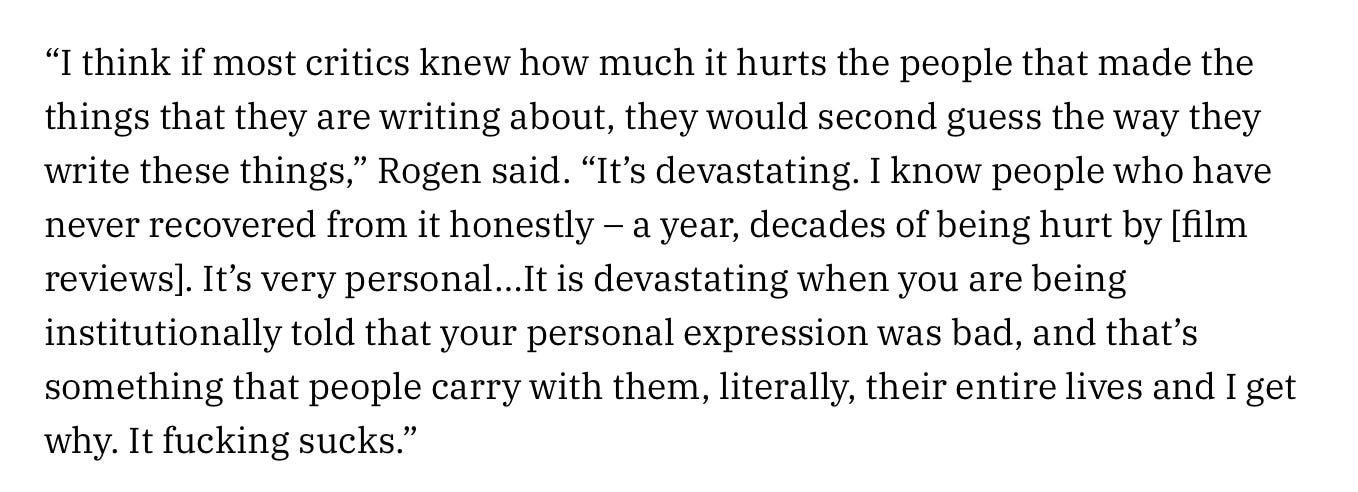


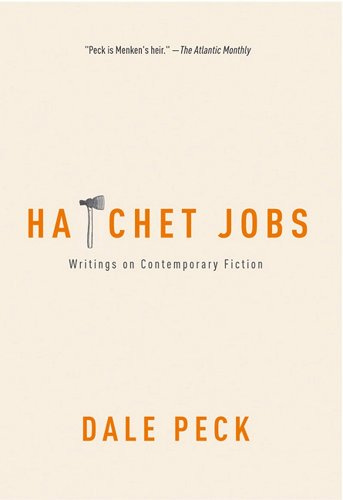
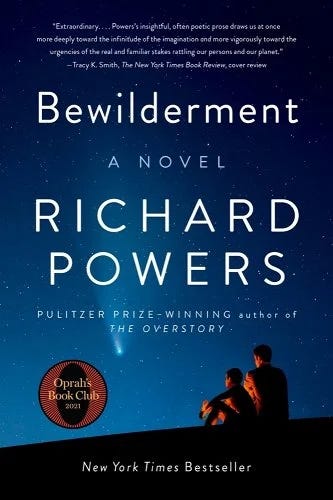
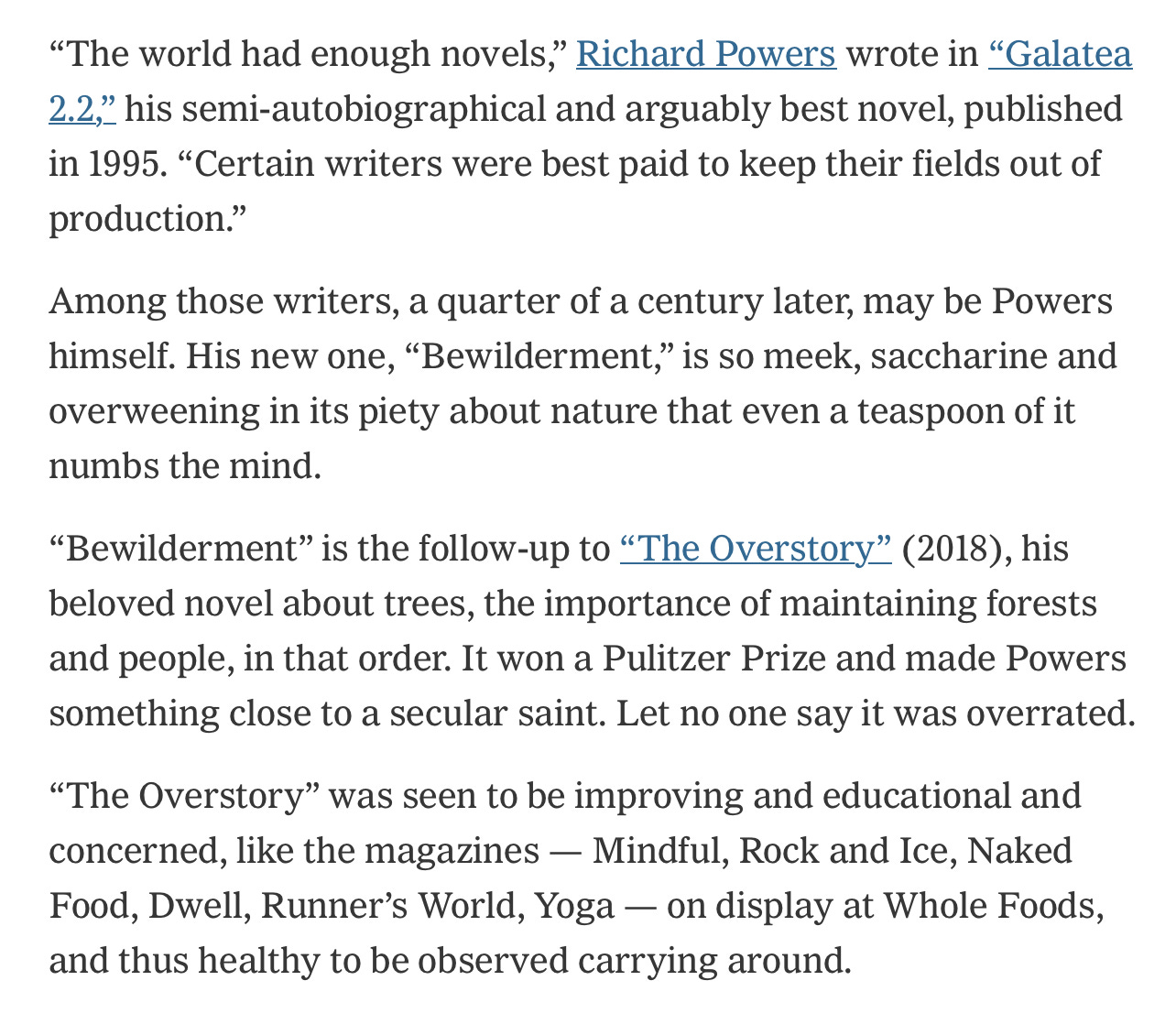

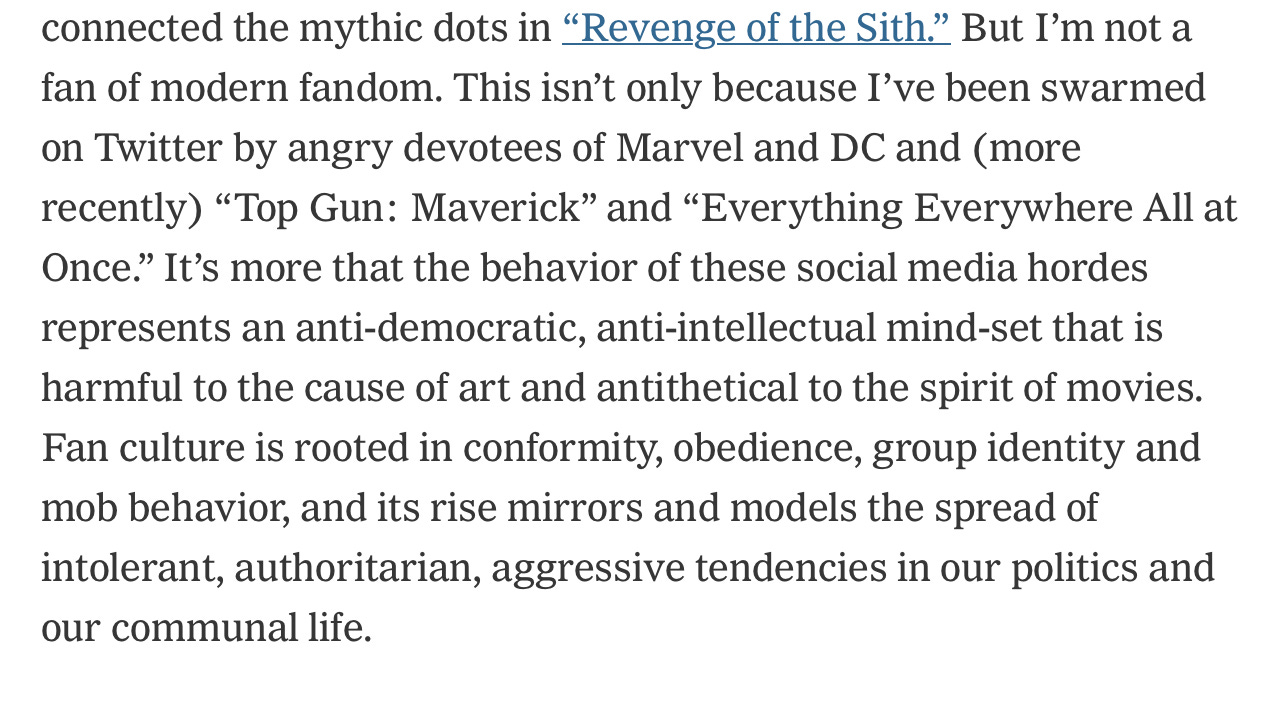
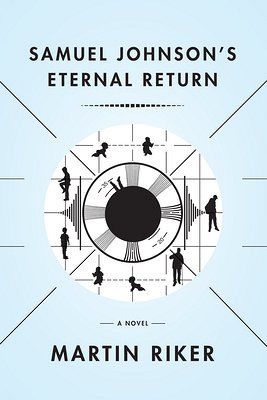
One of the many amazing things about The Complete Review is a reasonably calibrated scoring system. Gives you a real sense of which books really stood out. And at some point you realize a book getting B+ shouldn't put you off reading it. And then there are at least amazon/goodreads reviews. Authors really despite them for understandable reasons, but sometimes the emperor has not clothes. I've found myself reading the 1/2 star reviews just to see if I'm not just hallucinating a sense about a book. It's really a shame when blurbing/reviewing makes a lot of publishing feel like some kind of mid level marketing scam.
Quite frankly, I don't know how anyone could write something good without being able to make strong value judgements such as deciding when something is badly written/uninteresting/boring. Or just mediocre. And to be fair, a lot of lit-fic can feel like a kind of show and tell where people are bringing very personal stuff about their lives and identity, and on a social level it's just inappropriate to point out that book might be a bit of a self indulgent chore.
Interesting piece, John. Without getting too deep, I'll just share my initial thoughts. When talking about reviews, POV seems important.
For critics, reviews are obviously important -- it's what they do.
For consumers, reviews are important as supplementary opinions that may or may mix well with their own opinions -- or inspire them to check something out (or not).
For artists/creators, though, reviews seem natural byproducts of their work, but byproducts that they need not interact with or even acknowledge. The power is in the artist's hands when it comes to deciding if they want to allocate brain power toward a review or not. A review is just a person's reaction to your artwork: take it or leave it, and keep going. Likewise, to call a review "unfair" is just the artist's reaction to the review -- a review of a review. It's just, you know, a bunch of reactions to a work of art -- and IMO the artist always comes out ahead because they were brave enough to TRY SOMETHING, else the critic would have nothing to do.
Rogen's point seems above all this. It's just that: should the artist decide to acknowledge a review, it can hurt -- personally, even though it's not personal. And that's maybe something reviewers don't think enough about as they attempt to write as sharply as they can. That seems very valid and true.
I wonder: Does "The cultural ecosystem need both creative work and the critical commentary about that work"? The model now seems: feed people the stuff that other people are enjoying, and let them decide. There's no critic in that model, and I much prefer it. I literally cannot recall the last time I relied on a critic's review for anything. (Which makes you wonder . . . it's possibly only the artists'/industry reading reviews in some kind of anxious circle jerk, where as real people are pretty open to just trying stuff out . . . and let's not even get into all the BS that becomes an "NYT Bestseller").
I do wonder if traditional criticism is really "the work that must be done." For consumer goods, like cars etc.? Yes. But for art? It's so damn subjective. I always like to think about the hundreds of rejections and haters Bukowski accumulated, and still he's a beloved cultural icon.
The caveat to all this? Perhaps, in Litrahchah, critics serve as power brokers from a marketing/promo standpoint more than they do in TV/Film. But that's bad. I'd like to see more of a Netflix model for books. Let the people decide with a thumbs up or thumbs down -- or simply by the amount of "views" / "reactions" a work receives. Again, a critic is only one person, however "astute" they may be.